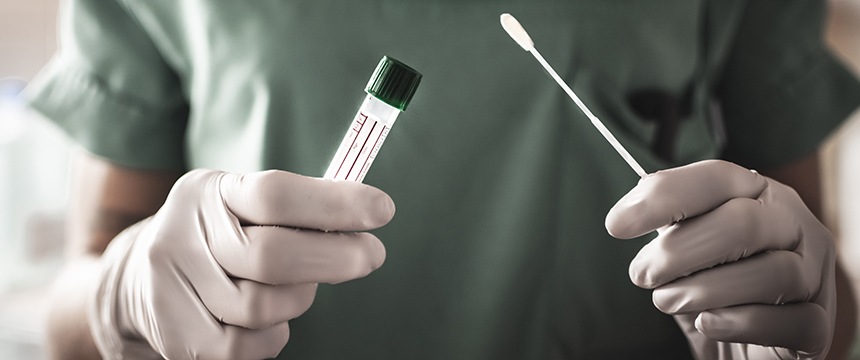Here Comes Mandatory COVID-19 Testing by Employers (But Not for Antibodies)

For all the time and effort spent on temperature checking and other anecdotal inquiries for COVID symptoms—and with all its inherent uncertainty given questions about the timing of COVID-19 onset—new Equal Employment Opportunity Commission (EEOC) guidance has come out, green lighting mandatory medical testing for COVID-19.
The New EEOC Guidance Allows for Mandatory Diagnostic Testing
The new guidance, dated April 23, provides as follows (with original sub-links):
A.6. May an employer administer a COVID-19 test (a test to detect the presence of the COVID-19 virus) before permitting employees to enter the workplace? 4/23/20
The Americans with Disabilities Act (ADA) requires that any mandatory medical test of employees be “job related and consistent with business necessity.” Applying this standard to the current circumstances of the COVID-19 pandemic, employers may take steps to determine if employees entering the workplace have COVID-19 because an individual with the virus will pose a direct threat to the health of others. Therefore, an employer may choose to administer COVID-19 testing to employees before they enter the workplace to determine if they have the virus.
Consistent with the ADA standard, employers should ensure that the tests are accurate and reliable. For example, employers may review guidance from the U.S. Food and Drug Administration about what may or may not be considered safe and accurate testing, as well as guidance from CDC or other public health authorities, and check for updates. Employers may wish to consider the incidence of false-positives or false-negatives associated with a particular test. Finally, note that accurate testing only reveals if the virus is currently present; a negative test does not mean the employee will not acquire the virus later.
Based on guidance from medical and public health authorities, employers should still require – to the greatest extent possible – that employees observe infection control practices (such as social distancing, regular handwashing, and other measures) in the workplace to prevent transmission of COVID-19.
See the link here.
Caveat: The new guidelines as worded allow employers to require employees to undergo COVID-19 in order to prevent the spread of the virus. Note the wording here:
“[E]mployers may take steps to determine if employees entering the workplace have COVID-19 because an individual with the virus will pose a direct threat to the health of others. Therefore, an employer may choose to administer COVID-19 testing to employees before they enter the workplace to determine if they have the virus.”
So it would appear that the FDA is fine with standardized “molecular” (nose swab) testing to diagnose current illness.
What About Serology – Antibody – Blood Testing?
On that score, the guidance limits testing to what is considered reliable and accurate—deferring primarily to FDA guidance:
“Consistent with the ADA standard, employers should ensure that the tests are accurate and reliable. For example, employers may review guidance from the U.S. Food and Drug Administration about what may or may not be considered safe and accurate testing.”
Again, see the link here.
In turn, the FDA FAQs on this topic are not supportive of the reliability or accuracy of serology testing either as a diagnostic test of current illness, or as or a reliable indicator of immunity:
FDA is not aware of an antibody test that has been validated for diagnosis of COVID-19 infection. While FDA remains open to submissions of these tests for such uses, based on the underlying scientific principles of antibody tests, we do not expect that an antibody test can be shown to definitively diagnose or exclude COVID-19 infection.
A positive result from an appropriately validated serology test that detects IgM is likely to indicate that someone currently has or has recently had the virus. But a serology can yield a negative test result even in infected patients (e.g., if antibody has not yet developed in response to the virus) or may be falsely positive (e.g., if antibody to a coronavirus type other than the current pandemic novel strain is present). Thus, antibody tests by themselves are of limited value in the immediate diagnosis of a patient where COVID-19 infection is suspected.
See the FDA serology FAQs here.
Given the FDA’s (current) position on (currently available) serology testing, the EEOC guidance would appear to exclude mandatory serology testing by employers. However, the liberal basis for the guidance would appear to allow for voluntary antibody (serology) testing.
None of this speaks to the issues of testing vendors, retention of testing records, records privacy, or liability for incorrect results. And as the guidance states, testing data is no substitute for adherence to social distancing practices. All such issues should be vetted with competent employment and healthcare counsel before moving forward.
Events around coronavirus are moving, the news changes every hour, and so does the legal framework in which companies are trying to operate and to survive. Our lawyers and staff are dedicated to helping our clients manage and leverage the fallout from the unprecedented business conditions imposed by the pandemic. Foley has created a multi-disciplinary and multi-jurisdictional team, which has prepared a wealth of topical client resources and is prepared to help our clients meet the legal and business challenges that the coronavirus outbreak is creating for stakeholders across a range of industries. Click here for Foley’s Coronavirus Resource Center to stay apprised of relevant developments, insights and resources to support your business during this challenging time. To receive this content directly in your inbox, click here and submit the form.
